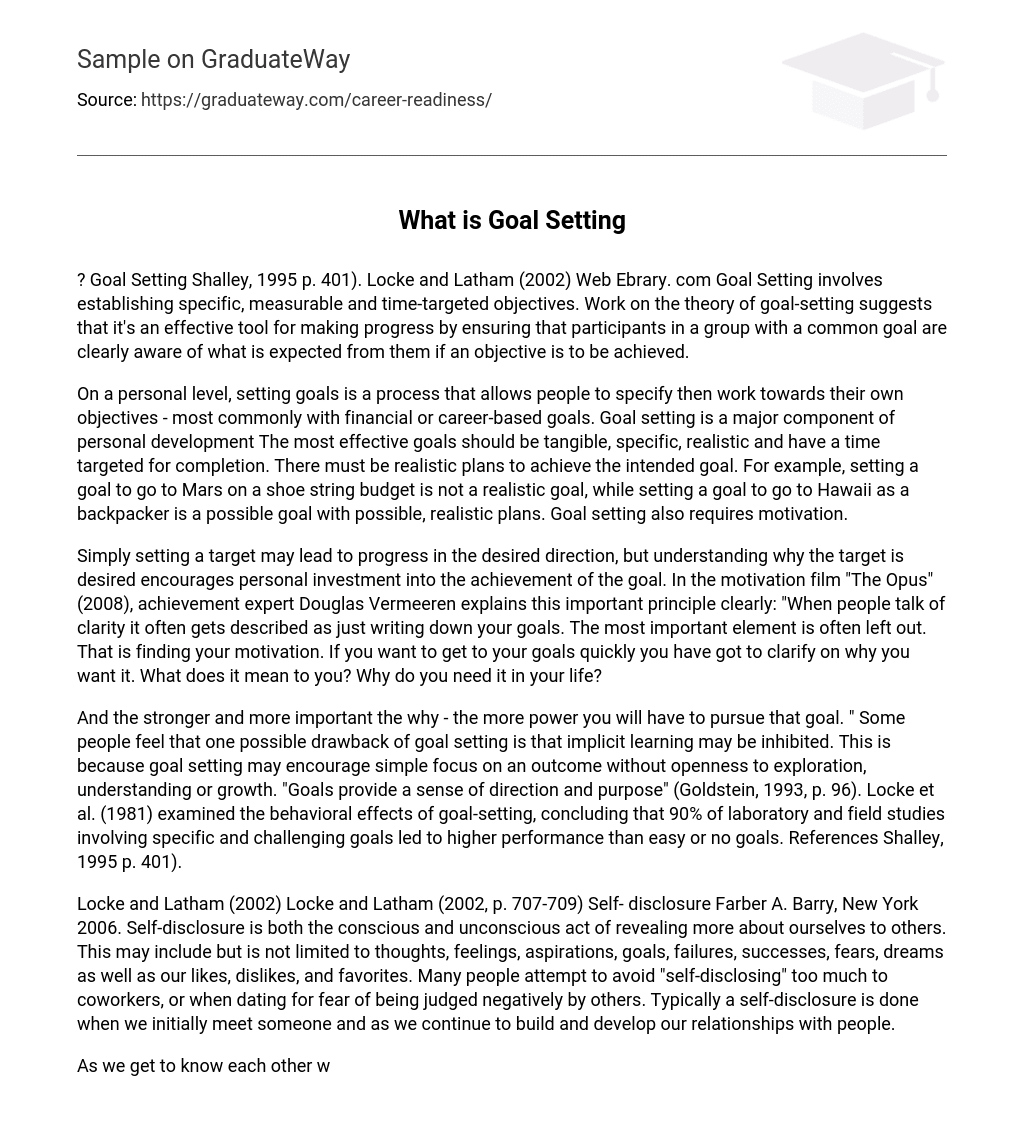Goal Setting involves establishing specific, measurable and time-targeted objectives. Work on the theory of goal-setting suggests that it’s an effective tool for making progress by ensuring that participants in a group with a common goal are clearly aware of what is expected from them if an objective is to be achieved.
On a personal level, setting goals is a process that allows people to specify then work towards their own objectives – most commonly with financial or career-based goals. Goal setting is a major component of personal development The most effective goals should be tangible, specific, realistic and have a time targeted for completion. There must be realistic plans to achieve the intended goal. For example, setting a goal to go to Mars on a shoe string budget is not a realistic goal, while setting a goal to go to Hawaii as a backpacker is a possible goal with possible, realistic plans. Goal setting also requires motivation.
Simply setting a target may lead to progress in the desired direction, but understanding why the target is desired encourages personal investment into the achievement of the goal. In the motivation film “The Opus” (2008), achievement expert Douglas Vermeeren explains this important principle clearly: “When people talk of clarity it often gets described as just writing down your goals. The most important element is often left out. That is finding your motivation. If you want to get to your goals quickly you have got to clarify on why you want it. What does it mean to you? Why do you need it in your life?
And the stronger and more important the why – the more power you will have to pursue that goal. ” Some people feel that one possible drawback of goal setting is that implicit learning may be inhibited. This is because goal setting may encourage simple focus on an outcome without openness to exploration, understanding or growth. “Goals provide a sense of direction and purpose” (Goldstein, 1993, p. 96). Locke et al. (1981) examined the behavioral effects of goal-setting, concluding that 90% of laboratory and field studies involving specific and challenging goals led to higher performance than easy or no goals. References Shalley, 1995 p. 401).
Locke and Latham (2002) Locke and Latham (2002, p. 707-709) Self- disclosure Farber A. Barry, New York 2006. Self-disclosure is both the conscious and unconscious act of revealing more about ourselves to others. This may include but is not limited to thoughts, feelings, aspirations, goals, failures, successes, fears, dreams as well as our likes, dislikes, and favorites. Many people attempt to avoid “self-disclosing” too much to coworkers, or when dating for fear of being judged negatively by others. Typically a self-disclosure is done when we initially meet someone and as we continue to build and develop our relationships with people.
As we get to know each other we self-disclose things. If one person is not willing to “self disclose” then the other person may stop disclosing information about themselves also. Self disclosure is an important building block for intimacy, intimacy can not be achieved without it. We expect self disclosure to be reciprocal and appropriate. “Self disclosure can be assessed on an analysis of cost and rewards which can be further explained by Social exchange theory“(Farber, 2006, WP Enc). Most self disclosure usually occurs early in relational development, but more intimate self disclosure occurs later on .
Male and female differences in self disclosure are mixed. Women self disclose to enhance a relationship where men self disclose relative to control and vulnerability. Men initially disclose more in heterosexual relationships. Women tend to put more emphasis on intimate communication with same sex friends than many men do. Self-disclosure is both the conscious and unconscious act of revealing more about ourselves to others. “This may include but is not limited to thoughts, feelings, aspirations, goals, failures, successes, fears, dreams as well as our likes, dislikes, and favorites“ (Farber, 2006, WP Enc.)
A lot of people attempt to avoid “self-disclosing” too much to coworkers, or when dating for fear of being judged negatively by others. Most of the time a self-disclosure is done when we initially meet someone and as we continue to build and develop our relationships with people. As we get to know each other we self-disclose things. If one person is not willing to “self disclose” then the other person may stop disclosing information about themselves also.
References
- Farber A. Barry. Self Disclosure in Psychotherapy. The Guilford Press. New York.





